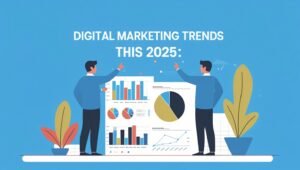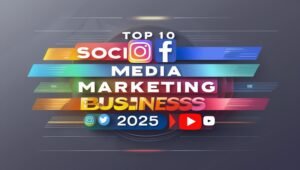The incorporation of Artificial Intelligence (AI) has fundamentally transformed business practices and relations. Predictive analysis, chatbots, and automation are just a few of the tools that AI offers, binding customers to companies in ways never before possible. It is apparent that artificial intelligence will be the most critical factor for the future advancement of marketing technology. However, what does this mean for companies and their digital marketing practices?
How Artificial Intelligence is Revolutionizing Digital Marketing
Digital marketing is unintendedly and excessively guided by AI technologies, and as a result, it is losing efficiency. With AI and its features becoming ever so popular and easier to access, their application rises by the minute. Using AI, it is extremely simple to optimize campaigns, improve brand perception, and provide unparalleled levels of customer support. Let’s analyze the factors that enable AI technology to progress at an uncontrollable pace.
1. Predictive Analysis: AI’s Unmatched Accuracy
The level of prediction based on examination of past AI performance is unparalleled in effectiveness, and this is where AI shines the most. AI enables companies to be ahead of the curve with their contesting needs, times that dominate the market, and targeted customer demographics.
For instance, AI can predict which customers are most likely to convert, helping businesses utilize their resources more efficiently. During website and social media engagement, AI tools can study user actions, allowing marketers to find relevant information that may be useful in the future. This powerful business intelligence keeps competition at bay, assuring marketers of offering the most suitable goods or services to potential customers at the most suitable period.
2. Chatbots and AI-Powered Customer Service
AI is also changing customer service processes. Companies are deploying AI chatbots to websites, social media, and even messaging applications where they interact with customers. These smart bots can autonomously provide product information, process orders, and provide marketing materials and advice without the need for any human support.
Through eliminating the need for human interaction during customer engagements, businesses can ensure rapid support services round-the-clock, increasing customer satisfaction while reducing reliance on human operators. By analyzing other conversations, AI marketing further assists chatbots by providing context-sensitive and contextually relevant answers, greatly easing the experience for the users.
3. Personalization and Targeted Content: The End of Generic Marketing
The era of broad marketing strategy deployments has vanished. Customers in the current era require personalized services, and AI is helping achieve that. Businesses can now segment their users and offer one-to-one targeted AI content, thereby resonating with the users.
AI tools for digital marketing can pull customer data, including browsing habits, purchase patterns, and demographic details, to create sharp and concise marketing messages. AI marketing encompasses mobile email campaigns, social media ads, or site content, where messages are specifically tailored to the customer’s preferences and behavioral patterns.
Using AI, e-commerce sites can analyze users’ previous purchases or browsing patterns and recommend products, boosting engagement rate, which improves sales. This highly maximized personalization enhances conversion rates while retaining long-term customers.
4. Automation of Marketing Tasks: Maximizing Efficiency
AI offers numerous powerful advantages, such as ultra automation of repetitive marketing tasks, which would otherwise be very physically draining. Email and AI can automate social media posting, and content material can also be formulated without human help, all while giving marketing professionals time to focus on more important goals.
Digital marketing tools powered by AI enable businesses to create automated workflows that perform specific tasks when triggered by a customer’s actions. For instance, an email reminder about an abandoned shopping cart can be sent to users who have added items to their cart but have not finalized the purchase.
With automated procedures in place, businesses are able to foster customer engagement and increase conversions without manual processes requiring constant implementation.
5. Improved Reporting and Data Visualization
AI serves as the backbone that helps businesses determine how efficiently their marketing campaigns are performing. Using AI for marketing provides marketers with more accurate analytics regarding campaign success, customer interactions, and overall return on investment.
Advanced AI algorithms can examine extensive data repositories to identify new patterns and trends within the dataset, even those that are not instantly obvious. These insights allow businesses to fine-tune their strategies, optimize ad spend, and identify areas for improvement in real-time.
As AI serves a multitude of purposes and continues to develop, marketers are likely to utilize sophisticated reporting tools that allow for the generation of forecasts and marketing strategy suggestions. With this data-driven methodology, it is guaranteed that marketing plans are always focused on the requirements of the users and the shifting currents of the market.
The Future of Marketing Technology
The future of marketing technology is sure to be impacted by artificial intelligence and products like ChatGPT. AI is already a critical component of every marketing plan and will only become more relevant going forward. For instance, AI will allow marketers to optimize for voice search as well as improve customer segmentation. Marketers will do more in less time with AI and achieve far greater results than before.
Marketing automation powered by AI will sophisticate even further, allowing companies to create seamless, omnichannel self-serve customer experiences. The combination of AI with VR and AR will enable marketers to create engaging, immersive VR marketing experiences in an entirely new way.
Even small businesses will be able to afford AI tools as advances are made to them. Businesses of all types will be able to compete, given the level playing field that real-time data analysis, customer behavior predictions, and task automation bring.
Final Thoughts
The integration of AI into digital marketing strategies is changing the industry dramatically, and early adopters will benefit immensely. AI can help businesses with significant aspects of marketing, ranging from predictive analytics to chatbots and automation, all of which promise better performance.
There is no doubt that AI will drive automation to greater heights, and in doing so, it will continue to provide businesses with new ways to reach and engage customers.
Adopting AI today will ensure that your marketing strategies place your business in a position to flourish tomorrow.









